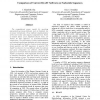Free Online Productivity Tools
i2Speak
i2Symbol
i2OCR
iTex2Img
iWeb2Print
iWeb2Shot
i2Type
iPdf2Split
iPdf2Merge
i2Bopomofo
i2Arabic
i2Style
i2Image
i2PDF
iLatex2Rtf
Sci2ools
108
click to vote
IPPS
2005
IEEE
2005
IEEE
Comparison of Current BLAST Software on Nucleotide Sequences
The computational power needed for searching exponentially growing databases, such as GenBank, has increased dramatically. Three different implementations of the most widely used sequence alignment tool, known as BLAST (Basic Local Alignment Search Tool), are studied for their efficiency on nucleotide-nucleotide comparisons. The performance of these implementations are evaluated using target databases and query sequences of varying lengths and number of entries constructed from human genomic and EST sequences. In general, WU BLAST was found to be most efficient when the database and query composition are unknown. NCBI BLAST appears to work best when the database contains a small number of sequences, while mpiBLAST shows the power of database distribution when the number of bases per target database is large. The optimal number of compute nodes in mpiBLAST varies depending upon the database, yet in the cases studied, remains surprisingly low.
Basic Local Alignment Search Tool | Database | Distributed And Parallel Computing | IPPS 2005 | Target Database |
Related Content
| Added | 25 Jun 2010 |
| Updated | 25 Jun 2010 |
| Type | Conference |
| Year | 2005 |
| Where | IPPS |
| Authors | I. Elizabeth Cha, Eric C. Rouchka |
Comments (0)

